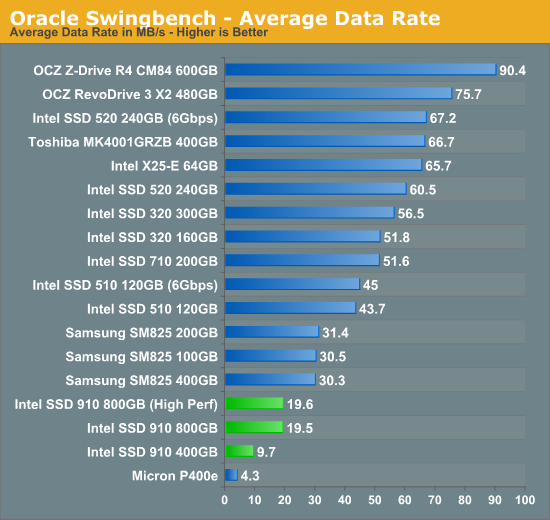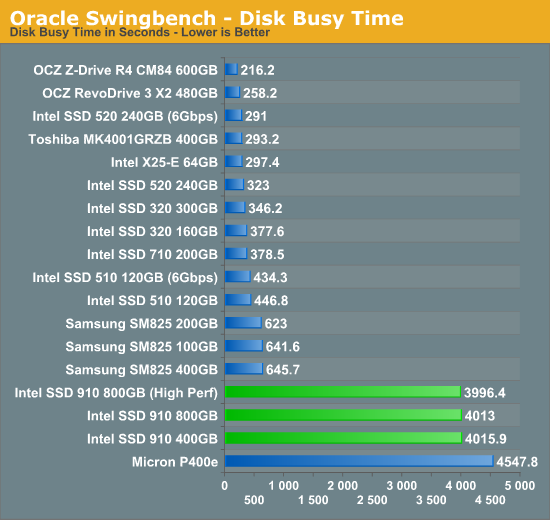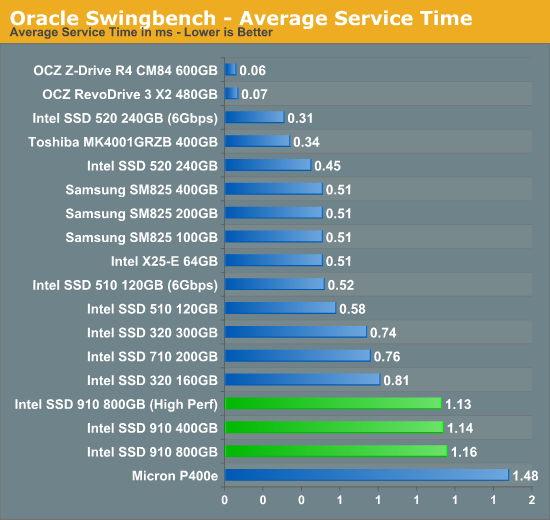The Intel SSD 910 Review
by Anand Lal Shimpi on August 9, 2012 1:00 PM EST- Posted in
- Storage
- SSDs
- Intel
- Intel SSD 910
Enterprise Storage Bench - Oracle Swingbench
We begin with a popular benchmark from our server reviews: the Oracle Swingbench. This is a pretty typical OLTP workload that focuses on servers with a light to medium workload of 100 - 150 concurrent users. The database size is fairly small at 10GB, however the workload is absolutely brutal.
Swingbench consists of over 1.28 million read IOs and 3.55 million writes. The read/write GB ratio is nearly 1:1 (bigger reads than writes). Parallelism in this workload comes through aggregating IOs as 88% of the operations in this benchmark are 8KB or smaller. This test is actually something we use in our CPU reviews so its queue depth averages only 1.33. We will be following up with a version that features a much higher queue depth in the future.

The 910 absolutely suffers through our Swingbench test, performing worse than a single Intel SSD 710. The explanation is pretty simple, small file, low queue depth IO is very slow on the 910. Running ATTO on a single 910 partition tells us everything we need to know:

Look at the small file write performance here. At 0.5KB a single 910 partition can only write at 413KB/s. Performance doesn't actually scale up until we hit 4KB transfers on the write side. I suspect this has a lot to do with why we're seeing poor performance here.












39 Comments
View All Comments
Lazarus52980 - Thursday, August 9, 2012 - link
Wow, fantastic review. Thanks for the good work Anand.quiksilvr - Thursday, August 9, 2012 - link
Considering the hefty price on these devices, anything short of AES-256 in this day and age is unacceptable (yes I know you can do software encryption, but hardware accelerated is much more secure)prime2515103 - Thursday, August 9, 2012 - link
I'm confused. Isn't AES-256 the same whether it's done in hardware or software? I thought hardware encryption just performed better (encrypts/decrypts faster).Rick83 - Thursday, August 9, 2012 - link
AES-256 is no safer than AES-128, according to somewhat recent cryptanalysis on the algorithms.madmilk - Thursday, August 9, 2012 - link
Hardware acceleration is probably for performance, even AES-NI can't keep up with multiple PCIe SSDs.And yeah, AES-256 easier crack than AES-128 now. Not that it matters, with computational complexity still at what, 2^99?
It's much easier to just kidnap the sysadmin than attack crypto.
JPForums - Friday, August 10, 2012 - link
Since you didn't mention which attack you are referring to, I'm going out on a limb and assuming you are talking about the related key attacks on the full AES256 / AES192. I don't know of any other attacks that work on all 14 / 12 rounds. You should be aware that while such an attack is widely considered impractical, it isn't even possible under many circumstances. You need some up front data that you can't always get. To keep in relation to this article, I'll limit my scope to on the fly encryption software as it is closely related to the encryption implemented on this device. Several on the fly encryption packages are known to be immune to this kind of attack (I'll single out TrueCrypt as a popular open source package that isn't vulnerable to related key attacks). As long as you are using a properly programmed encryption package for your full disk encryption, AES-256 is still "more secure" than AES-128.
That said, if you actually calculated the amount of time it takes to brute force AES-128, you'll find that PCs and possibly humanity will have become a long forgotten relic of the past. Of course, processing power changes, but not that quickly. A bigger concern would be attacks that successfully bring the set of keys down to a manageable level. For this issue, diversity is probably more important than bit length, assuming the brute force key set is sufficiently large (I.E. 2^128).
Troff - Thursday, August 9, 2012 - link
I always end up needing to be able to communicate directly with each "drive", which is usually problematic through a raid controller and software raid is invariably faster and in every case I've tried so far much, much faster.Araemo - Thursday, August 9, 2012 - link
Isn't this necessary for trim anyways? If the OS can talk to each 'drive', trim should work, and performance will stay good, right?web2dot0 - Thursday, August 9, 2012 - link
Hey Anand,Shouldn't FusionIO cards be part of this comparison? It will most likely destroy the 910.
happycamperjack - Thursday, August 9, 2012 - link
http://hothardware.com/printarticle.aspx?articleid...Not according to this article. And ioDrive compared in this article is actually about 2x the price of either intel 910 or z-drive r4.